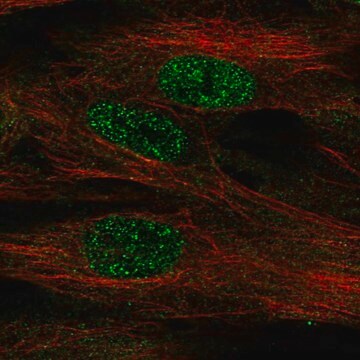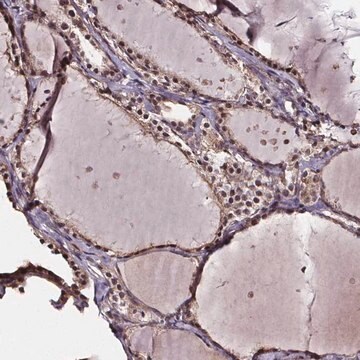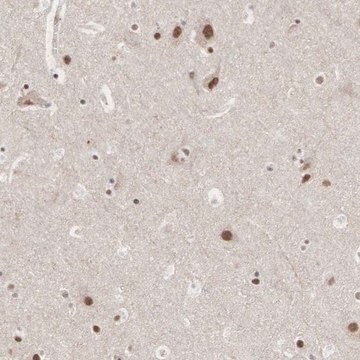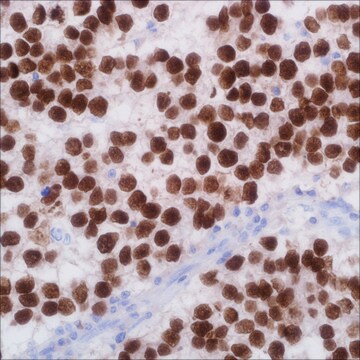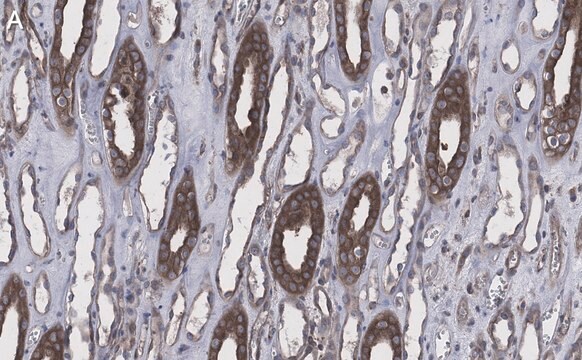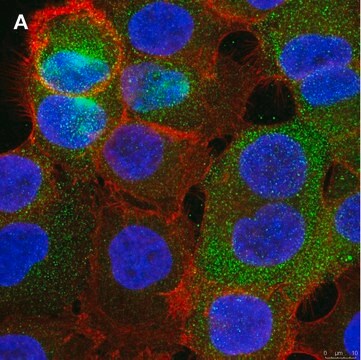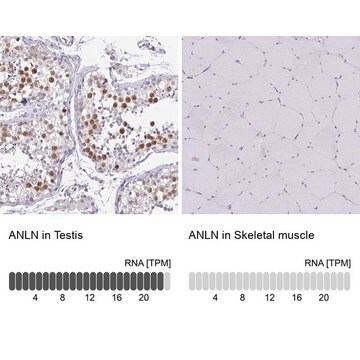推薦產品
生物源
rabbit
共軛
unconjugated
抗體表格
affinity isolated antibody
抗體產品種類
primary antibodies
無性繁殖
polyclonal
形狀
buffered aqueous solution
物種活性
mouse, human
技術
immunohistochemistry: suitable
western blot: 500-3000
NCBI登錄號
UniProt登錄號
運輸包裝
wet ice
儲存溫度
−20°C
基因資訊
human ... OPN3(23596)
免疫原
Synthetic peptide corresponding to a region within amino acids 1 and 45 of Opsin 3 according to NP_055137
應用
Suggested starting dilutions are as follows: IHC-Fr: 1:100-1:1000, IHC-P: 1:100-1:1000, WB: 1:500-1:3000. Not yet tested in other applications. Optimal working dilutions should be determined experimentally by the end user.
生化/生理作用
Opsins are members of the guanine nucleotide-binding protein (G protein)-coupled receptor superfamily. In addition to the visual opsins, mammals possess several photoreceptive non-visual opsins that are expressed in extraocular tissues. This gene, opsin 3, is strongly expressed in brain and testis and weakly expressed in liver, placenta, heart, lung, skeletal muscle, kidney, and pancreas. The gene may also be expressed in the retina. The protein has the canonical features of a photoreceptive opsin protein. [provided by RefSeq]
特點和優勢
Evaluate our antibodies with complete peace of mind. If the antibody does not perform in your application, we will issue a full credit or replacement antibody. Learn more.
外觀
1XPBS, 1% BSA, 20% Glycerol (pH7). 0.01% Thimerosal was added as a preservative.
免責聲明
Unless otherwise stated in our catalog or other company documentation accompanying the product(s), our products are intended for research use only and are not to be used for any other purpose, which includes but is not limited to, unauthorized commercial uses, in vitro diagnostic uses, ex vivo or in vivo therapeutic uses or any type of consumption or application to humans or animals.
未找到適合的產品?
試用我們的產品選擇工具.
訊號詞
Warning
危險聲明
危險分類
Aquatic Chronic 3 - Skin Sens. 1
儲存類別代碼
10 - Combustible liquids
水污染物質分類(WGK)
WGK 2
閃點(°F)
Not applicable
閃點(°C)
Not applicable
分析證明 (COA)
輸入產品批次/批號來搜索 分析證明 (COA)。在產品’s標籤上找到批次和批號,寫有 ‘Lot’或‘Batch’.。
Toshiaki Yoshimoto et al.
Annals of gastroenterological surgery, 2(2), 154-161 (2018-06-05)
Light emitting-diodes (LED) have various effects on living organisms and recent studies have shown the efficacy of visible light irradiation from LED for anticancer therapies. However, the mechanism of LED's effects on cancer cells remains unclear. The aim of the
Bin Li et al.
Oncology letters, 11(3), 1693-1698 (2016-03-22)
While the anti-tumor actions of ginsenosides from Panax notoginseng are well-studied, the anti-proliferative activity of 20(S)-protopanaxadiol saponins (PDS) in Sanchi ginseng on human ovarian cancer has not been reported, nor has its effect on migration of SKOV3 cells been investigated.
Toshiaki Yoshimoto et al.
Oncology reports, 47(5) (2022-04-14)
Irradiation with a specific wavelength of light using light‑emitting diodes (LEDs) has various effects on cells and organisms. Recently, the antitumor effects of visible blue light on tumor cells were reported; however, the mechanism and effects on the tumor microenvironment
我們的科學家團隊在所有研究領域都有豐富的經驗,包括生命科學、材料科學、化學合成、色譜、分析等.
聯絡技術服務